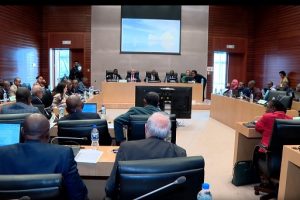BY DESTA GEBREHIWOT
As the world expeditiously and increasingly moves to a multipolar order, countries are having bucket lists of alternatives to pursue their foreign policy and form alliances. Being at the receiving end of western interventionist policies, African countries are now getting alternatives to meet their rising financial and development demands.
Having a young population and untapped wealth, the African continent remains the target of superpowers sometimes a place of competition. Positioning itself as a neutral partner, China is forcing other powerful nations to redefine their foreign policies towards Africa.
Chinese development-driven foreign policy is luring African countries portraying the latter as the optimal choice of partner. Chinese development programs are said to be best suited to African countries’ national conditions than the imperialist-alike foreign policy of other powers.
Beijing, which is the world’s second-largest economy with an equivalent population of Africa, has come up with a long list of partnership opportunities. From the staggering Belt and Road Initiative to other grand projects put forward in the Forum on China-Africa Cooperation, Beijing presented itself as an equal partner in poverty alleviation and economic advancement which many see as a stark departure from the western patronizing role.
Now Chinese marks are becoming increasingly visible in African countries. From modern railway projects to expressways and modern road networks, Beijing is not only setting the tone but its mark at the helm of Africa’s development projects.
China-Africa trade and China’s investment in Africa have been on a steady rise. Almost all African members of FOCAC have joined the big family of Belt and Road cooperation. All these have injected strong impetus into the China-Africa comprehensive strategic and cooperative partnership. To deepen their bond, the two sides have jointly prepared the China-Africa Cooperation Vision 2035.
Besides increasing its presence in the continent in terms of economic cooperation, the country is also on equal footing with Africa in opposing political intervention. In his speech during the 2021 FOCAC, Chinese President Xi Jinping said at the opening ceremony of the 8th FOCAC Ministerial Conference held in 2021 that China and Africa oppose intervention in domestic affairs, racial discrimination, and unilateral sanctions. We need to unequivocally stand for the just propositions of developing countries and translate our common aspirations and interests into joint actions.
China has launched a three–year programs in 8 areas allocating billions of USD for projects ranging from poverty reduction to green initiatives. The country also funneled billions of dollars to encourage more investment and trade between the two sides.
In so doing, Beijing also increases the scope of products enjoying zero-tariff treatment for the least developed countries (LDCs) having diplomatic relations with China, in a bid to reach 300 billion US dollars in total imports from Africa in the next three years.
China also aims to provide 10 billion US dollars of trade finance to support African export and build China a pioneering zone for in-depth China-Africa trade and economic cooperation.
At the heart of Sino-Africa cooperation is Ethiopia which headquarters of the African Union. China over the past two years has been Ethiopia’s shield in the Security Council preventing unfair interventions by some countries.
Both countries have in fact seen their ties cemented since the coming of Prime Minister Abiy Ahmed with Beijing either financing or building mega projects in Addis Ababa.
Beijing has been opposing political intervention by the West in connection with the conflict in Tigray state.
And lately, in a gesture that showcases the strong partnership of Ethiopia and China, the latter’s newly appointed Foreign Minister Qin Gang who stopped in Addis Ababa as per of his first visit to Africa since taking office pledged more elevated ties with Ethiopia.
Gang who also served previously as Chinese ambassador to the US held talks with Prime Minister Abiy Ahmed and Deputy Prime Minister and Foreign Minister Demeke Mekonnen yesterday.
Gang in his address to journalists after talks with Demeke said that his visit to Ethiopia carries special meaning in the two countries’ bilateral ties. Ethiopia is an anchor state in Africa with staggering influence. And the relations between both countries remain unbreakable as the minister expressed Beijing’s readiness to consolidate the all-rounded relation with Addis Ababa.
“I came here to demonstrate the close friendship between China and Ethiopia and the important position China and Africa partnership in the latter’s overall diplomatic agenda.”
Over recent years, the two countries cooperation reached a new height under the leadership of Prime Minister Abiy Ahmed and XI Jinping.
“Our two sides have a high degree of consensus in building political trust. And deepen and expand cooperation, the two countries to mutually beneficiary projects. China will encourage more Chinese investment in Ethiopia and will greatly engage in the construction of the country.”
Both countries also agreed to strengthen coordination in multilateral matters and jointly address global challenges China wants to see Ethiopia play a big role in international and regional frontiers. China is ready to intensify communication and cooperation to be partners in jointly defending fairness and justice in the global arena.
The two countries also signed a Memorandum of Understanding to strengthen political consultations and build on mutual trust.
Deputy Prime Minister Demeke who previously congratulated Gang on his appointment said that Ethiopia and China enjoy historic. And, the long longstanding relationships and over the years have seen elevation.
Demeke extended his appreciation to China for its position in northern Ethiopia in what he described as a principled stance and historic engagement in supporting Ethiopia’s sovereignty and territorial integrity.
It is to be noted that the two countries have signed a comprehensive strategic agreement and have been working towards its materialization.
“We have signed a Memorandum of Understating to boost our political consultation and further foster bilateral ties and expand our cooperation.”
“I have briefed the minister about the implementation of the Pretoria peace pact and the major activities the government of Ethiopia taking since the signing of the deal. We have reviewed encouraging security and peace development initiatives in the Horn region and Africa at large.”
Thetwo countries have also agreed to cement their historic cooperation in regional and global affairs in the face of unprecedented challenges, the Deputy Prime Minister added.
THE ETHIOPIAN HERALD WEDNESDAY 11 JANUARY 2023




